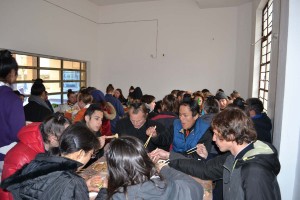 I had a conversation with some of my classmates the other day about eating meals with our Chinese companions. The fact is, noisy eating doesn’t carry the taboo of bad manners here the way it does back home. Notice your own reaction as I describe this– lip smacking, loud slurping, and that “chuk chuk” sound you get when someone chews with their mouth open. How did you react? Did you crinkle your nose, or have a little involuntary shudder? It’s pretty ingrained in me to have a fairly strong reaction to these behaviors, and I gather that most other westerners feel the same way.
I had a conversation with some of my classmates the other day about eating meals with our Chinese companions. The fact is, noisy eating doesn’t carry the taboo of bad manners here the way it does back home. Notice your own reaction as I describe this– lip smacking, loud slurping, and that “chuk chuk” sound you get when someone chews with their mouth open. How did you react? Did you crinkle your nose, or have a little involuntary shudder? It’s pretty ingrained in me to have a fairly strong reaction to these behaviors, and I gather that most other westerners feel the same way.
Change gears for a second. I once watched an lecture on TV about wine tasting. The instructor talked about essentially slurping the wine. Our sense of smell is such a large part of our sense of taste, so getting air into the wine and the bouquet into your nose lets you taste the wine more completely.
So what if our Chinese companions are experiencing their food more completely than we are thanks to eating habits that we won’t even consider because we have been taught to find them gross? Please don’t misunderstand, I am not arguing for slurping and open mouth chewing. But I think this example illustrates pretty clearly the idea of a cultural blind spot: an idea and experience that people of a given culture can’t even perceive because a cultural inhibition stops them from even looking in that direction. And I think this example also makes clear how subtle these inhibitions are. Coming to another country, living here, and being forced to deal with this culture as a daily reality instead of a holiday novelty has made me question many such customs that I had taken for granted before. I have been forced to reconsider the difference between being of a specific culture and being human.
